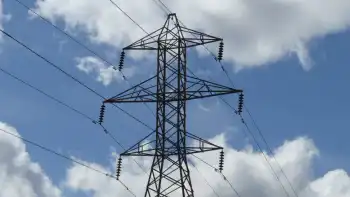Utilities' new pricing plans balance rewards against risks
DALLAS, TEXAS - Cheaper electricity comes at a price.
Retail electricity providers in Texas are developing new pricing plans that ask customers to guess whether natural gas prices, and, in turn, power prices, will rise or fall. The cheapest rates often come with the most risk to the customer. The offerings add a new element of choice to the deregulated Texas electricity market. Rather than simply choosing the cheapest provider, Texans must also consider how much risk they're willing to take.
Supporters of competition say it's a step toward developing a mature, competitive market. One day, the options for electricity service may be as diverse as those for mobile phone service or financial offerings, and Texas is where those electrical billing options are being invented.
"I think, in any kind of a market, you're going to see over time customized products that are a response to customer demand. I think that our companies are trying really hard to figure out what the customers want and tailoring products to meet those," said Barry Smitherman, a member of the Texas Public Utility Commission.
Financial planning experts urge consumers to play it safe and choose a plan that will keep energy bills predictable, and some electricity providers are finding that stable rates are more popular than risky prices.
"It's very difficult to have a budget for utilities if they're bouncing around all over the place," said Bryan Clintsman, owner of Clintsman Financial Planning in Southlake. "If they can somehow stabilize or make those payments more even, it really connects well for financial planning."
The market for power prices tends to track the natural gas market, and natural gas prices hit all-time highs in December before dropping steadily this year.
Deregulation of the electricity market adds an extra complication to the process of passing those power prices to consumers.
Until the end of 2006, the former utility monopolies, such as TXU Corp.'s TXU Energy, are bound by the price-to-beat rules in their native territories. Those companies must seek regulatory approval of price increases.
Though competitors aren't bound by the price to beat, the price has become a benchmark for many new pricing plans. Some plans guarantee the price will be a percentage discount to the price to beat. Some plans guarantee a fixed price close to the benchmark.
On other plans, the price changes monthly based on volatile fuel cost.
Financial planning experts say consumers should read contracts carefully. Before signing on the dotted line, understand the price and variability. Ask whether there are extra fees, such as a cancellation fee, or a special fuel fee.
"They need to look at the worst-case scenario. If they decide to go variable and it goes against them, what's that going to do to them?" said Lynn Lawrance, a certified financial planner with Financial Network. "Play the different scenarios in [your] mind."
It's particularly important for consumers to understand what might cause the price to change. TXU Energy in its new Market Tracker offering, for example, clearly lays out how the price tracks natural gas prices.
But some variable-rate offerings, such as one from Econnergy, leave prices to the discretion of the company.
Protection from price swings also comes at a price, such as long- term contracts with cancellation fees.
Direct Energy offers a further protection for a monthly fee. Customers can sign up for a heating and air conditioning maintenance plan.
And Direct Energy, whose parent company, Centrica, has experience in the deregulated British market, may consider more protection options. In the U.K., Centrica offers prepaid electricity, an extremely low-risk plan that sometimes carries higher rates than other plans.
"Some people, especially those on restricted budgets, want certainty. They want to know how much they'll be spending each month. Others don't mind; they'll play the market," said Deryk King, chief executive of Centrica North America, which owns Direct Energy in Texas. "We're only three or four years into deregulation in Texas. It's a 10- or 15-year process."
The new pricing plans also pose a risk to the electricity companies, and the question of how risky an offering is for the consumer may come down to how much the company has protected itself.
Gregg Hollenberg, vice president of residential and small business for Reliant Energy, said the fixed-rate offering is his most popular. But it requires a large investment by Reliant to plan power purchases to serve those customers profitably.
To fix the rate it charges customers, Reliant must also fix the price it pays for power in order to ensure a profit. It can do so by buying power ahead of time, forcing Reliant to predict how much power customers will use. He said it takes Reliant about 18 months to begin making money from a new customer.
If a company doesn't make those predictions properly - or doesn't bother to make them at all - it may be tempted to break the fixed-rate contract.
According to PUC rules, a company must give consumers 45 days' notice to change the terms of a contract. Javier Vega, chief executive of Amigo Energy, said he thinks the 45-day rule means any contract can be changed, no matter how much protection the company promises.
"I'm saying the risk is the same no matter what" for the consumer, Mr. Vega said.
The contract itself would probably override the PUC rule, but most electricity contracts include language similar to the 45-day rule.
Green Mountain Energy includes the 45-day language in its fixed- rate contract. But Paul Markovich, senior vice president of residential, said there's no benefit to changing the price.
"That is a recipe for disaster," Mr. Markovich said.
Of course changing the price would anger customers, he said.
Also, by purchasing power ahead of time for the fixed-rate customers, Green Mountain's biggest risk is losing those customers and being left with too much power.
Related News

Clean B.C. is quietly using coal and gas power from out of province
VANCOUVER - British Columbians naturally assume they’re using clean power when they fire up holiday lights, juice up a cell phone or plug in a shiny new electric car.
That’s the message conveyed in advertisements for the CleanBC initiative launched by the NDP government, which has spent $3.17 million on a CleanBC “information campaign,” including almost $570,000 for focus group testing and telephone town halls, according to the B.C. finance ministry.
“We’ll reduce air pollution by shifting to clean B.C. energy,” say the CleanBC ads, which feature scenic photos of hydro reservoirs. “CleanBC: Our Nature. Our Power. Our Future.”
Yet…




